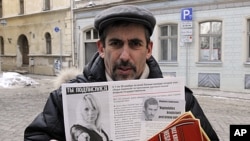Latvians are voting Saturday on a controversial refeferendum, choosing whether Russian should become the country's second official language.
Many analysts say the second-language referendum has little chance of winning a "yes" vote, but the question has triggered a heated debate between the country’s large ethnic Russian population and ethnic Latvians.
Latvian nationalists say the vote is a Kremlin-backed attempt to weaken their country’s sovereignty, and an attempt to force the tiny Baltic state toward Moscow’s sphere of influence. Russia sees the vote as a cry for help from Latvia's ethnic-Russian community, which Moscow says has been marginalized and treated poorly for years.
Iveta Grigule is a member of parliament from the Greens and Farmers Union.
She says Latvian society is split in two parts, and 20 years of trying to integrate the two language blocs have "failed completely." As she puts it, "Let's not deceive ourselves by thinking that we live in an united society, as an united nation. The nation is split, and the referendum says that clearly."
Latvia, one of three small Baltic states annexed by the former Soviet Union for most of the 20th century, has about two million residents. Many Russians moved from Soviet territory into Latvia during that time, and about one-third of Latvia's people now speak Russian, primarily or exclusively. The Russian and Latvian languages will be equally acceptable in matters of government if half of all eligible voters - more than 771,000 people - vote "yes" on the constitutional referendum.
Many analysts say ethnic Latvians are certain to vote "no," although some ethnic Russians disagree.
Parliament Deputy Andrejs Klementjevs is with the Harmony Center, a political party backed by most Russian speakers.
He says the effort to put the referendum on the ballot, which required almost 200,000 signatures, demonstrates the impact of Latvia's language problem. "No campaign, no propaganda is able to attract so many people if they feel well and secure. It is not so much about Russian language as it is about respect for that part of society," he said.
Harmony Center emerged as Latvia’s single biggest party after September's general election, with 31 of the 100 parliament seats, but the Russian-backed party was left out of the coalition government.
On the other side, 30 Latvian nationalist lawmakers tried legal action but failed to block the referendum. Oljars Kalnins of the Unity Party is one of them. He thinks the country needs to focus its efforts on important and relevant issues.
Kalnins says he hopes the referendum will create more of a sense of unity among all Latvians, and that afterwards they can to turn to "crucial issues" such as creating jobs, attracting investments, and dealing with social problems. The parliament deputy says, "The language issue would not be relevant then. If the pre-referendum campaign has split society, the situation after it's over will be different."
Most of Latvia's Russian-speaking population did not emigrate to Russia after 1991, when the Soviet Union broke apart. The new government in Riga offered them the possibility of naturalization - full citizenship - but many say their voices have not been heard in independent Latvia.
The vote takes place on Saturday. Preliminary results are expected in the early evening.
Latvians Vote on Russian as Official Language




